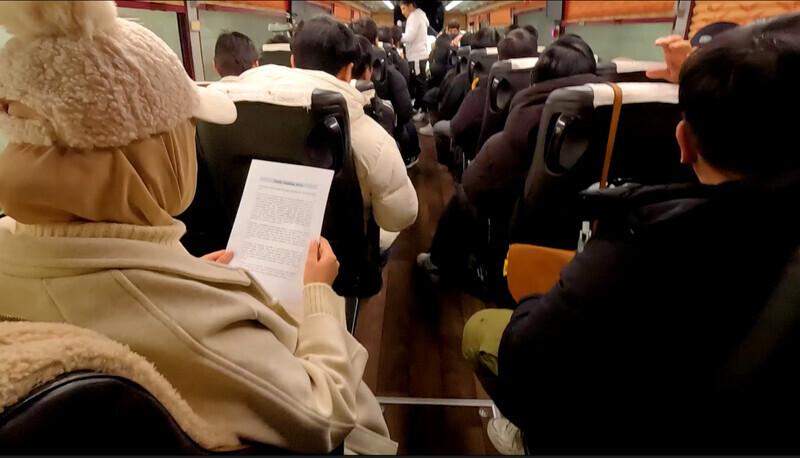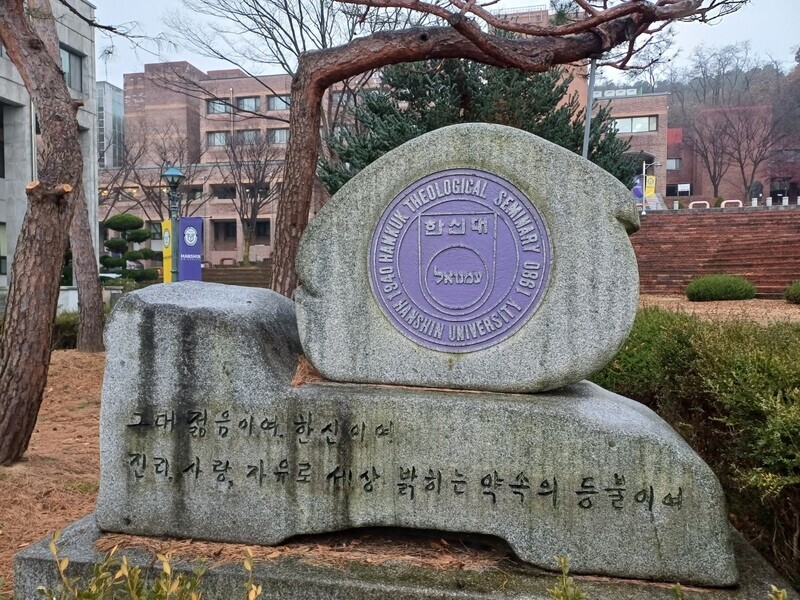hankyoreh
Links to other country sites 다른 나라 사이트 링크
[Exclusive] Hanshin University deported 22 Uzbeks in manner that felt like abduction, students say

Hanshin University in South Korea is at the center of a scandal after forcibly ejecting 22 international students to their home country of Uzbekistan during the middle of the school semester. The university stated that the students voluntarily boarded the return flight, but students told the Hankyoreh that, despite having no authority to do so, the university used physical force to deport them.
The Uzbekistan Embassy in Seoul has been alerted of the situation and is trying to get to the bottom of the matter with the university and the Ministry of Justice. There are signs that this could mushroom into a diplomatic conflict.
An investigation by the Hankyoreh on Monday found that 23 Uzbekistan students studying at Hanshin University’s Korean Language Institute in Osan, Gyeonggi Province, boarded a bus on the morning of Nov. 27 after being told by the school that they had to go to the immigration office to receive their alien registration cards.
Instead of going to the immigration office in Pyeongtaek, the bus picked up private security escorts at Hwaseong’s Byeongjeom Station and headed straight to Incheon International Airport. Once at the airport, the school staff and security escorts put all the students on a pre-booked flight home, except for one who appealed to the staff about health problems.
According to the international students, while aboard the bus, school staff members told them that if they were to go to the immigration office now, they would go to jail. “You have to leave now to come back to Korea,” the staff reportedly said. They also confiscated the students’ cell phones with the help of the private security officers.
The school expelled all language course students from Uzbekistan on the same day for failing to submit immigration documents, leaving the dormitory without permission, having a poor attitude toward coursework, and acting in a manner inconsistent with the university’s values.
“We led the students to leave the country under unavoidable circumstances,” was Hanshin University’s explanation.
“On Nov. 6, the immigration office run by the Ministry of Justice asked for the students’ bank balance certificates, and most of the students did not meet the conditions of their stay. We were worried that if we informed them, they would run away and become illegal immigrants,” the school stated.
The university said it was concerned that if the students ran off and became undocumented, the school would be disadvantaged in future recruitment of international students.

The students who were forced out of the country are decrying their treatment by the university. Those the Hankyoreh spoke to say the university intimidated them into returning home while they still had time left on their visas. Depending on when they entered the country, the students had received conditional three-month visas for language students, which would have expired around the official end of the semester, on Dec. 20.
However, they were forced to return to Uzbekistan without so much as being allowed to pack up their belongings in their dorm rooms beforehand. Hanshin University later informed the students that they would be refunded their remaining tuition if they signed a pledge acknowledging that they had left the country of their own accord.
“I got on the bus because they lied and tricked me. Soon after, security escorts dressed in all black got on the bus too,” one student, who wished to remain anonymous, told the Hankyoreh during an interview over a video call.
“I was scared when we were told [by the school staff] that we would be going to jail, so I felt I had no choice but to get on the plane. But now they’re saying they’ll only give us our money back if we say that we voluntarily left the country,” the student added, visibly shaken.
Another student shared disbelief and anger at the events.
“It doesn't make sense for the university to send all Uzbek students out of the country like this just because some students had problems. What right do they have to have booked our plane tickets without our knowledge?” they asked.
Relevant organizations say that Hanshin University’s act of deporting students was almost certainly illegal.
“The school was probably worried about the penalties it would receive if their students were found to be in the country illegally. However, schools have no authority to deport international students. It was the immigration office’s job to advise or notify students to leave the country after being expelled [from school] or having their visas expire so that they could return home voluntarily,” commented Cho Young-kwan, the secretary general of the group Migrant Center Friend, which works to provide legal support, education and counseling on rights to migrants in Korea.
Hanshin University is being investigated by the Osan Police Station, which has jurisdiction over the case. The Embassy of Uzbekistan in Seoul, which received the report, is also in contact with the deported students, Hanshin University, and the Ministry of Justice to determine the specific circumstances.
Criticism over efficacy of Korean policy requiring bank balances for sojourn
The en masse deportation of language students at Hanshin University is being attributed fundamentally to Ministry of Justice regulations and policing practices that are out of touch with actual conditions in the field.
According to a copy of the ministry’s “guidelines for international student visa issuance and sojourn management” obtained by the Hankyoreh on Monday, foreign nationals enrolled in language study programs require certification of a deposit bank balance covering their study costs, which is to be issued by a South Korean financial institution in their home country. That balance of 10 million won must be maintained for three or more months.
Based on these guidelines, the Pyeongtaek branch of the ministry’s Suwon Immigration Office — which has jurisdiction over Hanshin University — demanded that the language students submit balance certificates on Nov. 6. Many of the students from Uzbekistan failed to meet the bank balance requirement to stay in South Korea.
The problem is that the deported students had received inaccurate information from the university about the balance requirement.
During its overseas recruitment, Hanshin University told prospective students that the necessary balance only had to be maintained for one day. Accordingly, many of the students withdrew and spent a portion of the deposited funds after their arrival in South Korea.
After receiving notification later that the balance actually had to be retained for at least three months, Hanshin University hurried to deport the students due to concerns that they could end up being classified as illegal sojourners.
The university claims that the Ministry of Justice incorrectly advised it that the required period for the students’ balance certificate for study costs was only one day.
“It was only on Sept. 11, when the time had come for the students to arrive, that the Ministry of Justice suddenly changed its story about the balance maintenance period,” a Hanshin University official said.
“There were no responsible answers to our request for cooperation to prevent the possibility of [students being classified as] illegal sojourners,” they added.
But a ministry official countered that an “officer explained the financial capability review standards when Hanshin University officials visited the Pyeongtaek branch in May in connection with recruiting overseas students, and the relevant regulations were explained several times afterward too.”
Some observers suggested the core issue lay with the policy of using a maintained bank balance as a standard in determining eligibility for sojourn status.
Choi Jeong-gyu, an attorney with the law firm Wongok, said, “The school bears some of the blame, but the root problem lies with the Ministry of Justice and its haphazard policies.”
“They ought to think about whether it really helps things to deal with the rising numbers of immigrants by passing off responsibility for managing them to schools while making an issue of ineffective things like maintaining a certified bank balance,” he added.
By Lee Jun-hee, staff reporter
Please direct questions or comments to [english@hani.co.kr]

Editorial・opinion
![[Correspondent’s column] The real reason the US is worried about Chinese ‘overcapacity’ [Correspondent’s column] The real reason the US is worried about Chinese ‘overcapacity’](https://flexible.img.hani.co.kr/flexible/normal/500/300/imgdb/original/2024/0510/5217153290112576.jpg) [Correspondent’s column] The real reason the US is worried about Chinese ‘overcapacity’
[Correspondent’s column] The real reason the US is worried about Chinese ‘overcapacity’![[Editorial] Yoon’s gesture at communication only highlights his reluctance to change [Editorial] Yoon’s gesture at communication only highlights his reluctance to change](https://flexible.img.hani.co.kr/flexible/normal/500/300/imgdb/original/2024/0510/7717153284590168.jpg) [Editorial] Yoon’s gesture at communication only highlights his reluctance to change
[Editorial] Yoon’s gesture at communication only highlights his reluctance to change- [Editorial] Perilous stakes of Trump’s rhetoric around US troop pullout from Korea
- [Guest essay] Preventing Korean Peninsula from becoming front line of new cold war
- [Column] The state is back — but is it in business?
- [Column] Life on our Trisolaris
- [Editorial] Penalties for airing allegations against Korea’s first lady endanger free press
- [Editorial] Yoon must halt procurement of SM-3 interceptor missiles
- [Guest essay] Maybe Korea’s rapid population decline is an opportunity, not a crisis
- [Column] Can Yoon steer diplomacy with Russia, China back on track?
Most viewed articles
- 1[Correspondent’s column] The real reason the US is worried about Chinese ‘overcapacity’
- 2[Book review] Who said Asians can’t make some good trouble?
- 3Korea poised to overtake Taiwan as world’s No. 2 chip producer by 2032
- 4Yoon rejects calls for special counsel probes into Marine’s death, first lady in long-awaited presse
- 5Korea likely to shave off 1 trillion won from Indonesia’s KF-21 contribution price tag
- 6[Editorial] Yoon’s gesture at communication only highlights his reluctance to change
- 7[Photo] ‘End the genocide in Gaza’: Students in Korea join global anti-war protest wave
- 8S. Korea “monitoring developments” after report of secret Chinese police station in Seoul
- 9How many more children like Hind Rajab must die by Israel’s hand?
- 10Yoon voices ‘trust’ in Japanese counterpart, says alliance with US won’t change